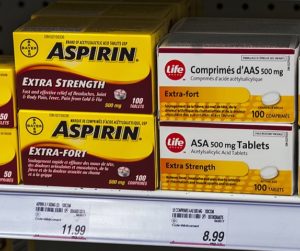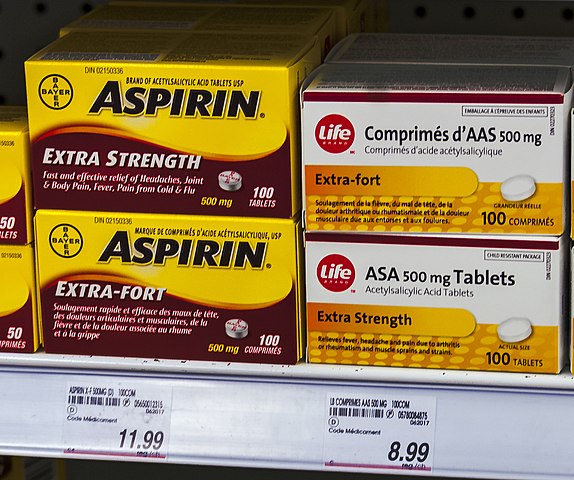
How does aspirin work? Aspirin works by stopping an enzyme called cyclooxygenase.
When our tissue or organs are damaged or infected, they produce prostaglandins. These are fatty acids that act like hormones. Prostaglandins do many different jobs in the body. They are similar to hormones but they are not hormones. Hormones are produced in glands, but prostaglandins are produced at the site of injury or infection. Almost all cells in the body are capable of producing prostaglandins.
Prostaglandins are the signal to start the body’s healing process when it is injured. If a blood vessel is injured, a prostaglandin called thromboxane stimulates blood clotting to heal the damage and they make the blood vessel constrict, reducing the amount of blood flow. Once the damage is repaired, they can also do the opposite. A prostaglandin called prostacyclin can reduce blood clotting, remove blood clots that are no longer needed, and make the blood vessels relax.
Prostaglandins can cause inflammation at the site of an injury. If you have cut yourself, the cells around the cut release prostaglandins that signal blood platelets to stick to the wound, stemming blood loss and starting the scabbing mechanism. They make the blood vessels contract to reduce blood loss. They make the blood vessels leak water into the damaged tissue to make it swell. This is the inflammatory response and it protects the wounded area and keeps foreign bodies away from your tissue. The prostaglandin summons white blood cells to clean out the damaged tissue.
Prostaglandins can cause pain when they build up on pain receptors. They can also make nerves more receptive to pain. They also cause a fever when they are produced in the central nervous system and the anterior hypothalamus. Prostaglandins do a whole host of other things as well that are all aimed at keeping our bodies ticking over and working properly.
So, what does this have to do with aspirin? Prostaglandins are synthesized from fatty acids in our cells using an enzyme called cyclooxygenase and aspirin stops this enzyme from working. That means the body doesn’t produce prostaglandins and the blood doesn’t clot, the blood vessels don’t constrict, there is no inflammation, and there is less pain. And this is why aspirin is such a wonderful drug. Usually, one drug targets one thing, but aspirin can be used to target a whole host of problems at the same time. People have taken aspirin as a regular pain killer or as a way to reduce the risk of heart disease or strokes. Aspirin can reduce clotting, which is the main cause of heart attacks and strokes. It can be used as a preventative method, or it can be used in recovery.
However, too much aspirin is obviously not a good thing. Aspirin prevents the cells from making prostaglandins, but our body makes them for a reason. If you prevent your body from producing them for too long it can cause problems. One common problem with aspirin is stomach bleeding. Our stomach lining completely replaces itself once every two days. The stomach lining produces prostaglandins that protect it. If you take too much aspirin, it can inhibit this and cause stomach bleeding and stomach ulcers.
Aspirin was introduced in 1897 by a German drug manufacturer called Bayer, which still exists. Aspirin is actually the brand name but Bayer’s rights to the name have expired. They introduced it as a painkiller and it was hugely popular, but its popularity began to decrease when paracetamol and ibuprofen were introduced. However, its popularity has risen again with its use as a preventative medicine for heart attacks and strokes. The chemical name for aspirin is acetylsalicylic acid.
The salicylic acid part of the chemical comes from the bark of the willow tree. People have known that the bark of the willow tree has medicinal properties for thousands of years, and probably even before that. The people of Sumer and Ancient Egypt used tea made from willow bark to lower fevers and to reduce inflammation. It was only in the 19th century that scientists worked out what the chemical in the willow bark that was causing these properties.
As an interesting aside, aspirin probably contributed to the power of Rasputin. The doctors of Tsar Nicholas II were giving the new drug aspirin to Alexi, the Tsar’s son. Unfortunately, Alexi was a hemophiliac and aspirin prevents clotting, which is not good for a hemophiliac. The longer he took aspirin, the worse he became. When Rasputin came on the scene, he persuaded the Tsar’s wife that she should stop using foreign medications and rely on spiritual treatment. Alexi stopped taking aspirin and his hemophilia improved and Rasputin gained more power. And this is what I learned today.
Sources
https://www.nytimes.com/2000/04/18/health/how-aspirin-works-its-magic.html
https://www.yourhormones.info/hormones/prostaglandins/
https://www.bhf.org.uk/informationsupport/heart-matters-magazine/medical/drug-cabinet/aspirin
https://my.clevelandclinic.org/health/articles/24411-prostaglandins
https://www.banamine.com/research/prostaglandins.asp
http://edition.cnn.com/2010/HEALTH/12/22/aspirin.history/index.html

